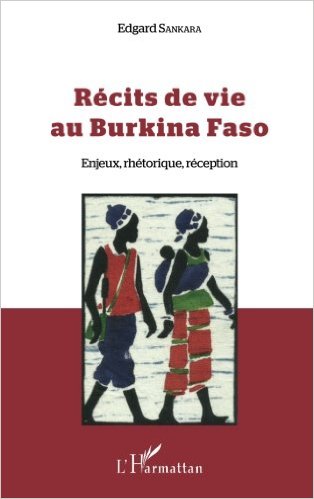Dr. Edgard Sankara, Récits de vie au Burkina Faso: Enjeux, rhétorique, réception
 Dr. Edgard Sankara, Récits de vie au Burkina Faso: Enjeux, rhétorique, réception (Paris: L’Harmattan, 2016). This book is the first comprehensive study of life narratives from or about the Francophone West African country, Burkina Faso. It covers a variety of authors: colonial African civil servants, politicians, scholars, religious leaders, and everyday citizens. The study explores the rhetorical and reception aspects of selected autobiographies: how a Burkina Faso national living in the U.S. writes a book (Of Water and the Spirit) and rhetorically uses traditional African knowledge as a substitute to Western knowledge in order to successfully conquer the American public; how the life story of a Burkina Faso prostitute is used by an American Anthropologist in order to debunk Western stereotypes of misery about Africa (Hustling is not Stealing/Exchange is not Robbery), and how this rhetorical intention may deprive a female storyteller of authorship and thus challenge collaborative autobiography. The study also looks at the relevance of written life narratives as archives and as an alternative version of Burkina Faso history. In that vein, the author advocates that life narratives by other Africans who worked in Burkina Faso (as civil servants in the French administration) in colonial times should also be counted as part of the national archive for the history of that country. The book offers a word of caution to Burkinabe historians seeking in life narratives alternative archives for the writing of a modern history of Burkina Faso: following the Rhetoric scholar Ruth Amossy, they must distinguish between life narratives that have an “argumentative dimension” (without any persuasive agenda) and those with an “argumentative orientation” (with a clearly persuasive agenda).
Dr. Edgard Sankara, Récits de vie au Burkina Faso: Enjeux, rhétorique, réception (Paris: L’Harmattan, 2016). This book is the first comprehensive study of life narratives from or about the Francophone West African country, Burkina Faso. It covers a variety of authors: colonial African civil servants, politicians, scholars, religious leaders, and everyday citizens. The study explores the rhetorical and reception aspects of selected autobiographies: how a Burkina Faso national living in the U.S. writes a book (Of Water and the Spirit) and rhetorically uses traditional African knowledge as a substitute to Western knowledge in order to successfully conquer the American public; how the life story of a Burkina Faso prostitute is used by an American Anthropologist in order to debunk Western stereotypes of misery about Africa (Hustling is not Stealing/Exchange is not Robbery), and how this rhetorical intention may deprive a female storyteller of authorship and thus challenge collaborative autobiography. The study also looks at the relevance of written life narratives as archives and as an alternative version of Burkina Faso history. In that vein, the author advocates that life narratives by other Africans who worked in Burkina Faso (as civil servants in the French administration) in colonial times should also be counted as part of the national archive for the history of that country. The book offers a word of caution to Burkinabe historians seeking in life narratives alternative archives for the writing of a modern history of Burkina Faso: following the Rhetoric scholar Ruth Amossy, they must distinguish between life narratives that have an “argumentative dimension” (without any persuasive agenda) and those with an “argumentative orientation” (with a clearly persuasive agenda).
This entry was posted in Books Published, Polyglot and tagged Fall 2017 Polyglot, French.
